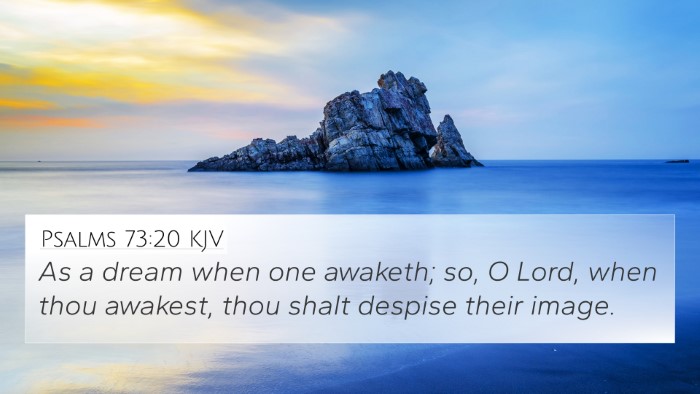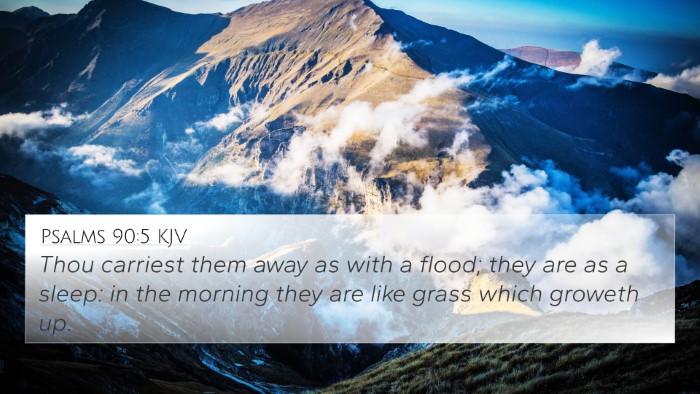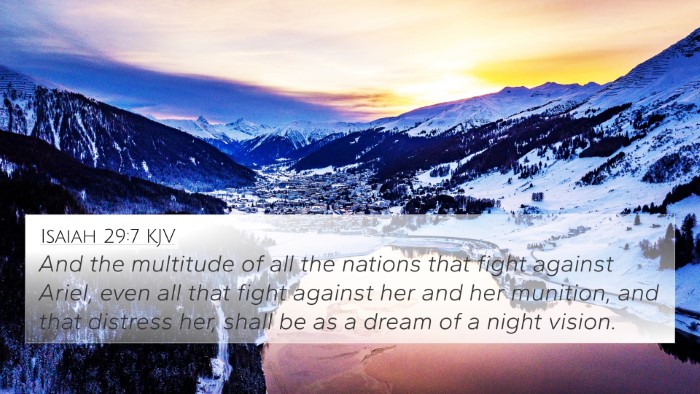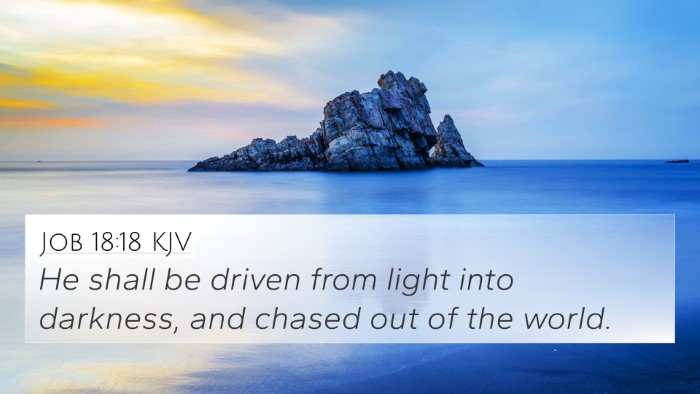Old Testament
Genesis Exodus Leviticus Numbers Deuteronomy Joshua Judges Ruth 1 Samuel 2 Samuel 1 Kings 2 Kings 1 Chronicles 2 Chronicles Ezra Nehemiah Esther Job Psalms Proverbs Ecclesiastes Song of Solomon Isaiah Jeremiah Lamentations Ezekiel Daniel Hosea Joel Amos Obadiah Jonah Micah Nahum Habakkuk Zephaniah Haggai Zechariah MalachiJob 20:8 Similar Verses
Job 20:8 Cross References
He shall fly away as a dream, and shall not be found: yea, he shall be chased away as a vision of the night.
Uncover the Rich Themes and Topics of This Bible Verse
Listed below are the Bible themes associated with Job 20:8. We invite you to explore each theme to gain deeper insights into the Scriptures.
Job 20:8 Cross Reference Verses
This section features a detailed cross-reference designed to enrich your understanding of the Scriptures. Below, you will find carefully selected verses that echo the themes and teachings related to Job 20:8 KJV. Click on any image to explore detailed analyses of related Bible verses and uncover deeper theological insights.

Psalms 73:20 (KJV) »
As a dream when one awaketh; so, O Lord, when thou awakest, thou shalt despise their image.

Psalms 90:5 (KJV) »
Thou carriest them away as with a flood; they are as a sleep: in the morning they are like grass which groweth up.

Isaiah 29:7 (KJV) »
And the multitude of all the nations that fight against Ariel, even all that fight against her and her munition, and that distress her, shall be as a dream of a night vision.

Job 27:21 (KJV) »
The east wind carrieth him away, and he departeth: and as a storm hurleth him out of his place.

Psalms 18:10 (KJV) »
And he rode upon a cherub, and did fly: yea, he did fly upon the wings of the wind.
Job 20:8 Verse Analysis and Similar Verses
Understanding Job 20:8
Job 20:8 states: "He shall fly away as a dream, and shall not be found: yea, he shall be chased away as a vision of the night." This verse is a part of Zophar's speech responding to Job's lamentations about his suffering and the seeming success of the wicked.
Summary of Meaning
This verse encapsulates the idea that the ultimate fate of the wicked is ephemeral; like a fleeting dream, they will eventually vanish and cannot be found. A critical reflection here involves the transient nature of worldly power and success, illustrating that while the wicked may appear prosperous for a moment, their downfall is inevitable.
Insights from Commentaries
-
Matthew Henry:
Henry notes that Zophar uses vivid imagery of dreams and visions to convey that the wicked's prosperity is illusory. Just as dreams vanish upon waking, so too will the success of the unrighteous disappear, highlighting the temporary nature of worldly achievements.
-
Albert Barnes:
Barnes emphasizes the fatalistic view about the end of the wicked. He suggests that the verse serves as a warning to those who rely on false security and sinful ways, indicating their inevitable judgment and demise, which will come swiftly and without warning.
-
Adam Clarke:
Clarke offers a perspective on the metaphor of the dream, suggesting that the fleeting nature of dreams serves a purpose in showcasing the futility of life when lived apart from godliness. He encourages readers to focus on eternal truths rather than temporal pleasures.
Cross-References for Job 20:8
Job 20:8 can be seen in light of other Biblical texts that echo similar themes about the fate of the wicked:
- Psalms 37:10 - "For yet a little while, and the wicked shall not be: yea, thou shalt diligently consider his place, and it shall not be." This verse reassures the faithful that the wicked will ultimately disappear.
- Psalms 73:19 - "How are they brought into desolation, as in a moment! They are utterly consumed with terrors." This highlights the sudden downfall of the wicked.
- Proverbs 14:32 - "The wicked is driven away in his wickedness: but the righteous hath hope in his death." This emphasizes the contrast between the wicked and the righteous at the end of life.
- Isaiah 57:1 - "The righteous perisheth, and no man layeth it to heart: and merciful men are taken away, none considering that the righteous is taken away from the evil to come." This reflects on the fate of the righteous versus the wicked.
- Matthew 7:13-14 - "Enter ye in at the strait gate: for wide is the gate, and broad is the way, that leadeth to destruction, and many there be which go in thereat." This demonstrates the difference between the paths of the wicked and the righteous.
- James 1:11 - "For the sun is no sooner risen with a burning heat, but it withereth the grass, and the flower thereof falleth, and the grace of the fashion of it perisheth: so also shall the rich man fade away in his ways." This conveys the fleeting nature of riches and prosperity.
- Lamentations 4:16 - "The anger of the Lord hath divided them; he will no more regard them: they respected not the persons of the priests, they favored not the elders." This illustrates God's judgment against the wicked.
Thematic Connections
Thematically, Job 20:8 connects with a broader narrative in the Bible regarding divine justice and the fate of the wicked compared to the righteous. Many scriptures build on the theme of the transient nature of sin and the eternal impact of righteous living.
Inter-Biblical Dialogue
Interpreting Job 20:8 through the lens of various books, we can observe:
- Ecclesiastes 12:14 - "For God shall bring every work into judgment, with every secret thing, whether it be good, or whether it be evil." This reinforces the notion of ultimate accountability.
- Galatians 6:7 - "Be not deceived; God is not mocked: for whatsoever a man soweth, that shall he also reap." This shows the principle of divine justice applied across both Testaments.
- Revelation 20:15 - "And whosoever was not found written in the book of life was cast into the lake of fire." This echoes the finality of the wicked’s fate, a reoccurring theme from Job to Revelation.
Conclusion
Job 20:8 serves as a sobering reminder of the fleeting nature of worldly power, the inevitability of judgment, and the contrast between the temporary success of the wicked and the enduring legacy of the righteous. By exploring this verse through public domain commentaries and cross-references, readers gain a deeper understanding of its implications within the larger biblical narrative.
For those interested in further study, utilizing Bible cross-reference guides, tools for Bible cross-referencing, and Bible concordances can enrich one’s understanding of biblical themes and facilitate comparative Bible verse analysis. As you engage with the scriptures, consider how connections between Bible verses can illuminate the intricate dialogue within the pages of the Bible.



